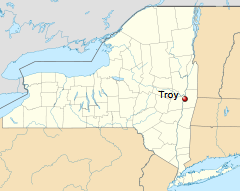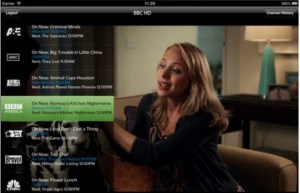
HissyFitWatch: When contract negotiations with the local cable company get a little too heated for comfort.
The city of Troy, N.Y. has lived with an expired franchise agreement with local cable company Time Warner Cable for more than a decade. After a shouting match erupted between a city councilman and a city economic development coordinator over its renewal, now we know why.
City officials managed to complete a tentative renewal with the cable company back in March, subject to city council review. The agreement comes even as Verizon’s FiOS fiber to the home network threatens to provide the cable company with some competition in the region.
As part of the renewal, Time Warner has agreed to provide $80,000 to fund a Digital Technology Lab at the Arts Center of the Capital Region. It will also front $70,000 to help construct a studio for a new government channel that will deliver coverage of city council meetings, which could draw some high ratings if tensions always run this high.
Troy also gets the right to collect the maximum franchise fee allowed by law and receives a $200,000 settlement to cover alleged franchise violations that occurred under the old agreement.
One of Time Warner Cable’s biggest skeptics on the city council is Councilman Bill Dunne, (D-District 4). He’s heard complaints about Time Warner’s prices and service from his constituents for some time, and told The Record he is “cautiously optimistic” about the potential deal, but stressed it will not be approved by the council until it is thoroughly reviewed.
Dunne suspects the cable company has made a fortune off Troy residents for years, and he wants to closely examine how well the cable company has done in upstate New York before handing them a lengthy contract extension.

Troy, New York
“I would like to see an independent auditor open up the books on Time Warner Cable … to see exactly where the money is going and how much money is being made [from Troy cable subscribers],” he told the Troy newspaper.
Some residents suspect whatever Time Warner Cable “gives” the city as a result of contract negotiations will be quickly made back in future rate increases.
“These negotiations are a sham because Time Warner Cable is negotiating with our money,” Troy resident Bill Thompson tells Stop the Cap! “If they give the city $500,000, they’ll just raise our rates to get that money back.”
Thompson says he applauds Dunne’s skepticism, and believes bringing in competition from Verizon is the only way to keep prices in check.

Christopher, during happier times.
Dunne’s ongoing concerns about Time Warner caused a fracas during last Thursday’s city council meeting, when Dunne won approval to take the Time Warner Cable franchise renewal off the table. In its place, Dunne’s new substitute resolution forming a working group to study the proposed franchise renewal and more importantly, perform an audit of Time Warner Cable and their supporting documents.
That decision infuriated Economic Development Coordinator Vic Christopher, who had been working with Time Warner Cable and the mayor’s office to push for a speedy approval of what he felt was a well-reviewed franchise renewal agreement. When Christopher objected to the study group, and delaying the agreement in general, Councilman Ken Zalewski (D-District 6) suggested he and the mayor’s office were representing the cable company more than city residents.
That did it.
As the meeting ended, a shouting match ensued between an offended Christopher, Zalewski, and Dunne. Christopher called the city council “obstructionists” and then followed up on his Twitter account accusing the council of talking everything to death. Dunne suggested Christopher should run for office if he didn’t like the way the council represented the interests of Troy residents.
“Christopher’s petulance was an amazing spectacle to watch, especially considering nobody was directly attacking him,” Thompson says. “He took it as a personal attack and responded in kind, and it only reinforced the notion the mayor’s office was in a hurry to get this agreement signed.”
[flv width=”480″ height=”290″]http://www.phillipdampier.com/video/The Record Spat in Troy Over TWC 4-22-11.mp4[/flv]
The hissyfit over a Time Warner Cable franchise agreement extension was caught on a cell phone camera, and the resulting video was promptly published online by The Record, Troy’s local newspaper. (1 minute)
TWC Franchise Agmt


 Subscribe
Subscribe







